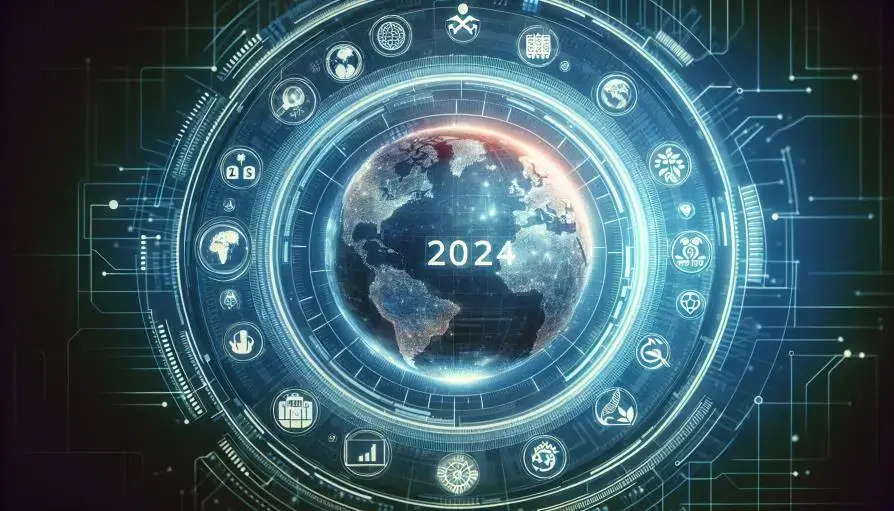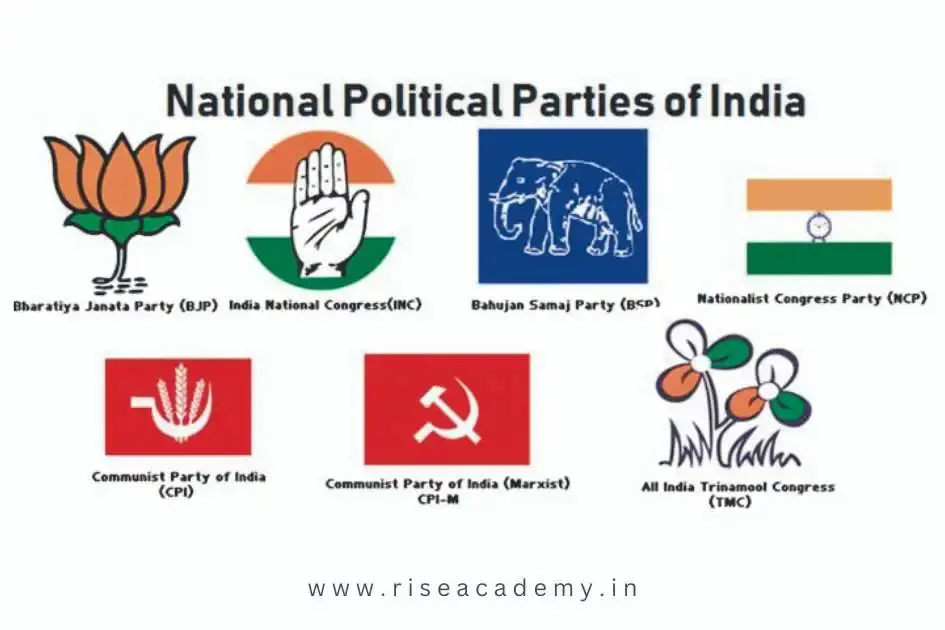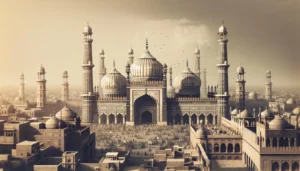Staying updated with current affairs 2024 is pivotal for those preparing for various competitive exams, ranging from UPSC and SSC to banking and insurance sectors. The Supreme Court’s recent endorsement of Electronic Voting Machines (EVMs) underscores the importance of staying informed about judicial developments that impact the democratic process in India.

Testbook’s Current Affairs Today initiative plays a vital role in simplifying the preparation process by offering daily current affairs and monthly compilations in PDF format, catering to an audience eager to assimilate knowledge across a spectrum of topics, including finance, GK questions, and technological innovations.
Key Developments in Indian Politics
Overview of Major Political Parties

Bharatiya Janata Party (BJP)
- Originated from the Rashtriya Swayamsevak Sangh (RSS) in 1980.
- Boasts a membership of nearly 180 million, claiming to be the world’s largest political organization.
- Led by Prime Minister Narendra Modi, who seeks a third term in the upcoming elections.
- Achieved a historic win in 2014, establishing its first majority government.
Indian National Congress
- Established in 1885, it is India’s oldest political party.
- Dominated Indian politics post-independence, governing for over two-thirds of the years since 1947.
- Credited with foundational liberal and secular policies under Prime Minister Jawaharlal Nehru.
- Faced significant challenges maintaining power post-2014 elections.
- Rahul Gandhi leads the party, representing the main opposition in the 2024 elections.
Aam Aadmi Party (AAP)
- Emerged from an anti-corruption movement in 2011.
- Founded by Arvind Kejriwal in 2012.
- Governed Delhi since 2015 and is a part of the INDIA alliance for the 2024 elections.
- Faces challenges due to pre-election arrests of leaders including Kejriwal.
Regional Political Dynamics
Dravida Munnetra Kazhagam (DMK)
- A strong regional force in South India.
- Currently governs Tamil Nadu.
- Third-largest party in terms of seats in the lower house of Parliament.
All India Trinamool Congress (AITC)
- Founded nearly 25 years ago by Mamata Banerjee, who has led West Bengal for approximately 13 years.
- Fourth-largest party by parliamentary seats.
- Participates reluctantly with Congress against BJP in 2024 polls.
State-Specific Insights
Karnataka
- Shows a “revolving door” pattern in assembly polls but consistently supports BJP in Lok Sabha since 1999.
- BJP projected to win the majority in the 2024 Lok Sabha Elections.
Telangana
- Dominated by Telangana Rashtra Samithi (TRS) since its formation in 2014.
- In the 2019 elections, TRS won the majority of Lok Sabha seats.
Karnataka
- BJP has won all Lok Sabha seats since 2014.
- Predicted to maintain this streak in the 2024 elections.
These developments underscore the dynamic and evolving landscape of Indian politics, with major parties gearing up for the pivotal 2024 elections, each presenting distinct strategies and facing unique challenges.
Economic and Financial Updates

Global Economic Projections and Inflation Trends
- Global Economic Growth: The global economy is projected to grow by 3.1% in 2024 and 3.2% in 2025, indicating a steady yet moderate pace.
- Inflation Dynamics: Inflation rates are showing a faster than anticipated decline across most regions, with global headline inflation expected to drop to 5.8% in 2024 and further to 4.4% by 2025.
Regional Economic Forecasts
- East Asia and Pacific: Economic growth in this region is expected to slow down to 4.5% in 2024, primarily due to a forecasted slowdown in China’s economic activities.
- Europe and Central Asia: These regions are projected to see a growth moderation to 2.4% in 2024, with a slight increase to 2.7% in 2025.
- Latin America and the Caribbean: Economic growth is predicted to marginally increase from 2.2% in the previous year to 2.3% in 2024, and to 2.5% in 2025.
- Middle East and North Africa: Assuming no escalation in regional conflicts, the growth rate is expected to stabilize at 3.5% for both 2024 and 2025.
- South Asia: A slight decrease in growth from 5.7% to 5.6% is anticipated in 2024, with a recovery to 5.9% expected in 2025.
- Sub-Saharan Africa: This region is projected to experience a growth rebound to 3.8% in 2024 and further to 4.1% in 2025.
Implications for Emerging Markets
- Investment Trends: Investment growth in emerging markets and developing economies is projected to remain subdued unless significant policy interventions are made.
- U.S. Economic Outlook: In the United States, consumer spending growth is expected to slow down in 2024, although the overall economic resilience is likely to prevent a severe downturn.
- Fiscal Policies and Labor Market: The U.S. fiscal deficit is projected to narrow to 5.9% of GDP in 2024, with labor markets showing signs of normalization.
Key Economic Challenges and Policy Directions
- Inflation and Monetary Policies: Despite the decline in inflation, the persistence of inflation above target levels and higher unit labor costs are challenging for aligning with medium-term inflation objectives. This situation necessitates maintaining a restrictive monetary policy stance.
- Strategic Government Spending: There is a critical need for governments to prioritize investments in human capital to address issues like slowing productivity, aging populations, digitalization, and climate change.
Trade and Industry Updates
- India’s Trade Agreements and Industrial Growth: India is set to sign significant trade agreements with Australia and the UAE, with industrial output showing a modest growth of 1.3% as of February 2024.
- Digital Lending and Export Policies: The Reserve Bank of India has introduced draft guidelines to enhance transparency in digital lending. Additionally, the government has adjusted export policies, notably by relaxing the ban on onion exports.
- Global Sanctions and Aviation Developments: The European Union has imposed sanctions on Russia’s state-run diamond producer Alrosa. Meanwhile, Indian airline IndiGo has expanded its fleet with an order of 30 Airbus A350-900 aircraft.
Technological Advancements and Innovations
Sustainable Technologies and AI Integration
- Artificial Intelligence and Machine Learning: The integration of AI and ML technologies is revolutionizing sustainable practices by optimizing energy use and reducing emissions, essential for combating climate change.
- ESG Reporting Solutions: Advanced software solutions are now crucial for companies to effectively manage and report on Environmental, Social, and Governance (ESG) factors, meeting increasing regulatory requirements.
Cutting-Edge Health Innovations
- mRNA Vaccine Development: In the UK, a personalized mRNA vaccine targeting melanoma is undergoing Phase III clinical trials, marking a significant step in cancer treatment.
Military and Naval Technological Enhancements
- Indian Navy’s Advancements: The INS Sagardhwani has embarked on the Sagar Maitri Mission-4 to Oman, showcasing India’s focus on strengthening maritime research and alliances.
- DRDO’s Defense Innovations: The DRDO has developed the VSHORADS, a man-portable air defense missile system, enhancing India’s self-reliance in defense technologies.
Employment Opportunities in Emerging Technologies
- Generative AI: This technology is not just about mimicking human creativity but also about opening new avenues in various fields including AI ethics and content creation.
- Extended Reality (XR): With applications spreading from gaming to professional training, XR is creating diverse opportunities in tech roles such as software developers and AR/VR engineers.
- Cybersecurity: As digital threats evolve, there is a growing demand for cybersecurity professionals, including ethical hackers and security engineers, to protect sensitive information and prevent data breaches.
Innovations in Computing and Automation
- Quantum and Edge Computing: These technologies are set to transform data handling and processing, with significant implications for sectors like finance and cybersecurity.
- Robotic Process Automation (RPA): RPA continues to automate routine tasks, significantly improving efficiency and reducing the need for manual intervention in various industries.
Advances in Digital Health and Biotechnology
- Tech for Early Disease Detection: Innovations are underway to enhance the capabilities of technology in detecting diseases at an early stage, potentially saving lives through early intervention.
- Genomics and Biotechnology: The field of genomics is expanding rapidly, offering new career opportunities and advancements in personalized medicine and biotechnological applications.
These technological advancements are not only transforming industries but are also paving the way for new career paths and opportunities, reflecting a shift towards more integrated, efficient, and sustainable practices across various sectors.
Environmental and Social Initiatives
Net Zero and Clean Energy Initiatives
- Global Net Zero Commitments: The international community is intensifying efforts to achieve net-zero emissions by 2050, with businesses setting stringent sustainability targets to meet stakeholder and regulatory expectations.
- Advancements in Clean Energy: The shift from fossil fuels to renewable sources is pivotal in sustainability strategies. Many countries and companies are significantly increasing their investments in renewable energy projects and energy-efficient technologies.
Sustainable Supply Chain Practices
- Businesses are responding to consumer demand for sustainable products by enhancing the sustainability of their supply chain operations. This includes the adoption of eco-friendly packaging, the utilization of sustainable production materials, and the implementation of waste reduction strategies.
Sustainability Reporting Trends
- Increased Transparency: 2024 marks a significant year in sustainability reporting, with companies now required to disclose the environmental and social impacts of their operations. This transparency is crucial in managing climate-related risks and combating greenwashing.
Circular Economy Strategies
- Economic and Environmental Benefits: Embracing a circular economy model, businesses are redesigning products to be more durable, reusable, or recyclable, potentially unlocking USD 4.5 trillion in economic benefits by 2030.
- Innovative Business Models: Retailers are adopting circular business models, including rental, resale programs, and repair services, to minimize waste and maximize resource use.
Biodiversity and Conservation Efforts
- Promoting Biodiversity: With the loss of biodiversity identified as a significant global threat, efforts to preserve natural resources have intensified, adopting a nature-positive approach to ensure an increase in natural habitats by 2030.
- Biodiversity Net Gain: In the UK, new legislation mandates that urban developments enhance biodiversity by at least 10%, promoting ecological balance.
Environmental Awareness Campaigns and Policies
- World Environment Day 2024: Hosted by Saudi Arabia, this event focused on the critical issues of land degradation, desertification, and drought, highlighting the role of forests in biodiversity, water conservation, and medicine.
- SCGC’s Reforestation Efforts: The “Plant-Cultivate-Protect” campaign is dedicated to forest restoration and educating communities on sustainable reforestation practices.
Wildlife Conservation and Urban Ecology
- Nilgiri Tahr Conservation: The Tamil Nadu government is conducting a comprehensive survey in collaboration with the IUCN to estimate and protect the population of the Nilgiri Tahr.
- Wetland City Accreditation: India’s Ministry of Environment, Forest, and Climate Change has nominated three cities for the Ramsar Convention’s Wetland City Accreditation, aiming to enhance urban biodiversity.
Conclusion
Through an in-depth examination of significant political shifts, economic forecasts, and technological innovations, alongside pressing environmental and social initiatives, this article has shed light on the multifaceted landscape of global and national affairs as we step into 2024.
The pivotal roles played by major political entities in shaping democratic processes, the nuanced economic trends promising a blend of challenges and growth opportunities, and the groundbreaking advancements in technology and environmental sustainability collectively underscore the evolving dynamics of today’s world.
These developments not only highlight the importance of adaptive strategies across various sectors but also emphasize the increasing relevance of informed participation and dialogue in addressing the complexities of contemporary issues.
As we navigate through these transformative times, the implications of these shifts are profound, touching upon every facet of society from governance and economic stability to technological empowerment and environmental stewardship. The forward-looking insights into potential policy directions, innovation-driven employment landscapes, and global commitments to sustainability offer a roadmap for stakeholders at all levels to facilitate meaningful change. This article, therefore, serves as a reminder of our shared responsibility to foster a sustainable and equitable future, urging continued engagement, research, and action across the diverse domains that define our interconnected world.
FAQs
Q: What are the key questions to ask about current affairs in 2024?
A: When exploring current affairs for competitive exams, consider the following questions: Who is the current head of the RBI? Who is credited with creating Bitcoin? What is the official currency of India? Who holds the presidency in India? When does India celebrate its independence day? Where is India’s equivalent of Silicon Valley? What is the acronym for India’s space agency?
Q: Can you list five significant current affairs topics?
A: Here are five notable current affairs topics:
- 55 AAP MLAs meet with Sunita, advocating that the incarcerated Kejriwal should not resign.
- In Uttar Pradesh, a 2018 defamation case against Rahul Gandhi is postponed.
- The Child Rights Body in Andhra Pradesh insists on adherence to half-day school norms.
- The Congress party pledges to rejuvenate the railways as a growth engine for India, according to Kharge.
Q: Which website is recommended for staying updated on current affairs?
A: Jagranjosh.com is a recommended website for current affairs. It offers comprehensive coverage across various categories such as sports, politics, national and international awards, economy, appointments, science, and technology, and more, which can be helpful in preparing for government exams.
Q: What are the best resources for obtaining current affairs information?
A: The most valuable resources for current affairs include The Hindu and The Indian Express newspapers, Yojana and Kurukshetra magazines, the Press Information Bureau releases, and content from Rajya Sabha TV.


